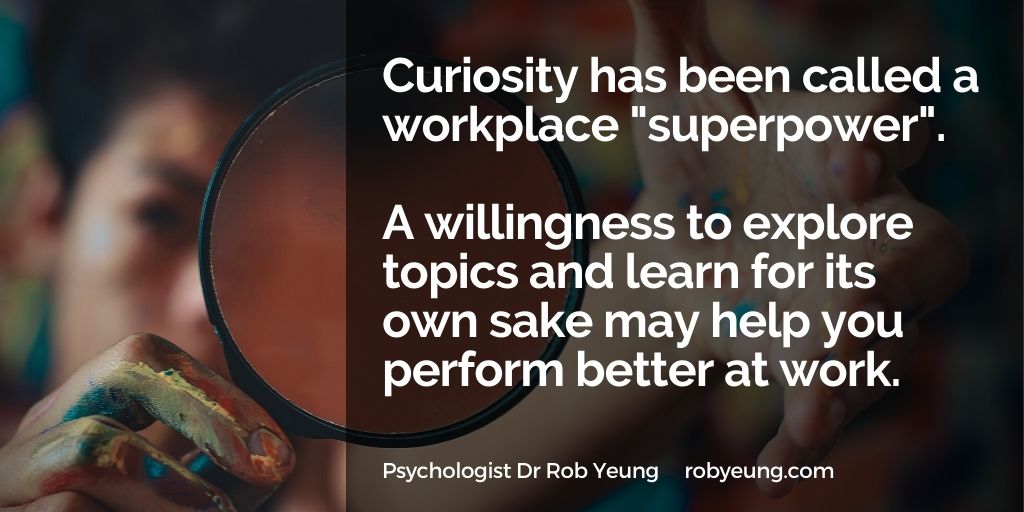5 facts about the importance of curiosity in work and life

Psychological science is increasingly coming to the conclusion that curiosity is a rather powerful force in our lives. Let’s look at 5 evidence-based facts about curiosity (what I called ‘Awe’ in Chapter 1 of my book, E is for Exceptional: The New Science of Success), what it is, and why it matters.
1. Curiosity is about exploration and learning for its own sake
Many students are willing to learn because it may help them to do well in their exams. Many workers are willing to do the same in order to perform well, get noticed, and get promoted. But curiosity is about exploring and learning for its own sake rather than to achieve particular outcomes in the real world such as exam success or job promotion.
In an academic paper reviewing the research on curiosity in the workplace, a team of psychological scientists led by Singapore Management University’s Filip Lievens made a number of observations about curiosity:
- Curiosity could be defined as “the desire to know, to see, or to experience that motivates exploratory behaviour, information seeking, and learning.”
- Many businesses are now calling curiosity a “superpower” for both individuals and organisations that are interested in lifelong learning, innovation, making change happen, and gaining competitive advantage.
- Curiosity is often accompanied by positive emotions such as joy. In other words, true curiosity is about the fun of learning as opposed to learning to achieve a result.
2. Curiosity is a powerful predictor of academic performance
A group of academic researchers led by Sophie von Stumm at the University of Edinburgh has called curiosity the “third pillar” of academic performance. Based on extensive analyses, the researchers found that intelligence is the single most powerful predictor of academic performance, which is hardly surprising.
A personality dimension called Conscientiousness – a measure of a person’s diligence, reliability, desire to be organised, and willingness to work hard – was also a powerful influence on people’s academic performance. Again, not a surprise.
But the third most important factor was curiosity. In other words, having a “hungry mind” – a willingness to explore and learn about things for its own sake – really matters.
3. Curiosity predicts job performance, too
Curiosity doesn’t just benefit students who want to boost their academic performance. For example, a research investigation conducted by Patrick Mussel at Julius-Maximillians University of Würzburg in Germany has found that curiosity is strongly related to job performance.
This has practical implications for employers. Organisations that are keen to hire high performers should specifically test candidates for their levels of intellectual curiosity. Given two candidates who are similarly intelligent and who have roughly the same technical skills, the one who is more curious and open-minded about learning for fun will probably end up doing the better job.
4. Curiosity actually has multiple components
Different groups of researchers measure curiosity in different ways, but most of these research groups have one thing in common: they agree that curiosity is not just one thing, but has several components.
For example, consider the extent to which you agree or disagree with the following statements:
- “I enjoy the fact that my mind continues to work through complex problems outside of work.”
- “I look to take on work tasks where I will have to think in depth about something.”
The more strongly you agree with those statements, the more you would be said to possess the curiosity component that a research group led by academic Todd Kashdan call joyous exploration – finding pleasure in learning about topics and solving problems for its own sake.
But now reflect on the degree to which you agree or disagree with this pair of statements:
- “When given a complex problem at work, I find it difficult to rest until I find the answer.”
- “I sometimes end up spending hours on a single problem because I have a strong need to find the answer.”
Stronger agreement with those two statements would indicate more of a different component of curiosity called deprivation sensitivity – a feeling that something is missing or wrong because until a problem is solved.
There are other components that together make up the concept that we know as curiosity. But the point is that curiosity isn’t just one thing that people either have or don’t have. People can be curious in very different ways.
5. Curiosity depends on your state of mind
Do you ever find yourself getting bored with topics or deciding to quit on tasks because you’re struggling with them? In order to boost your curiosity, try changing your mental self-talk, the messages you tell yourself.
For example, if you sometimes think “I don’t need to learn this”, try asking yourself “What would my future look like if I did?” If you’re thinking “Oh, this is boring”, try saying to yourself: “I wonder why other people find it interesting.”
Or if you say to yourself “I’m already OK at this”, try to set yourself a higher standard. Ask yourself: “Who do I admire who is better at this?” and “How might this be of value to me if I got better at this, too?”
Curiosity is allowing yourself to go off on tangents. If you are finding something not very exciting, give yourself permission to explore some aspect of the topic that you do find more interesting. By discovering things that help to make a topic more interesting to you, you may learn more – and perform better in the long run.


Leave a Reply
You must be logged in to post a comment.